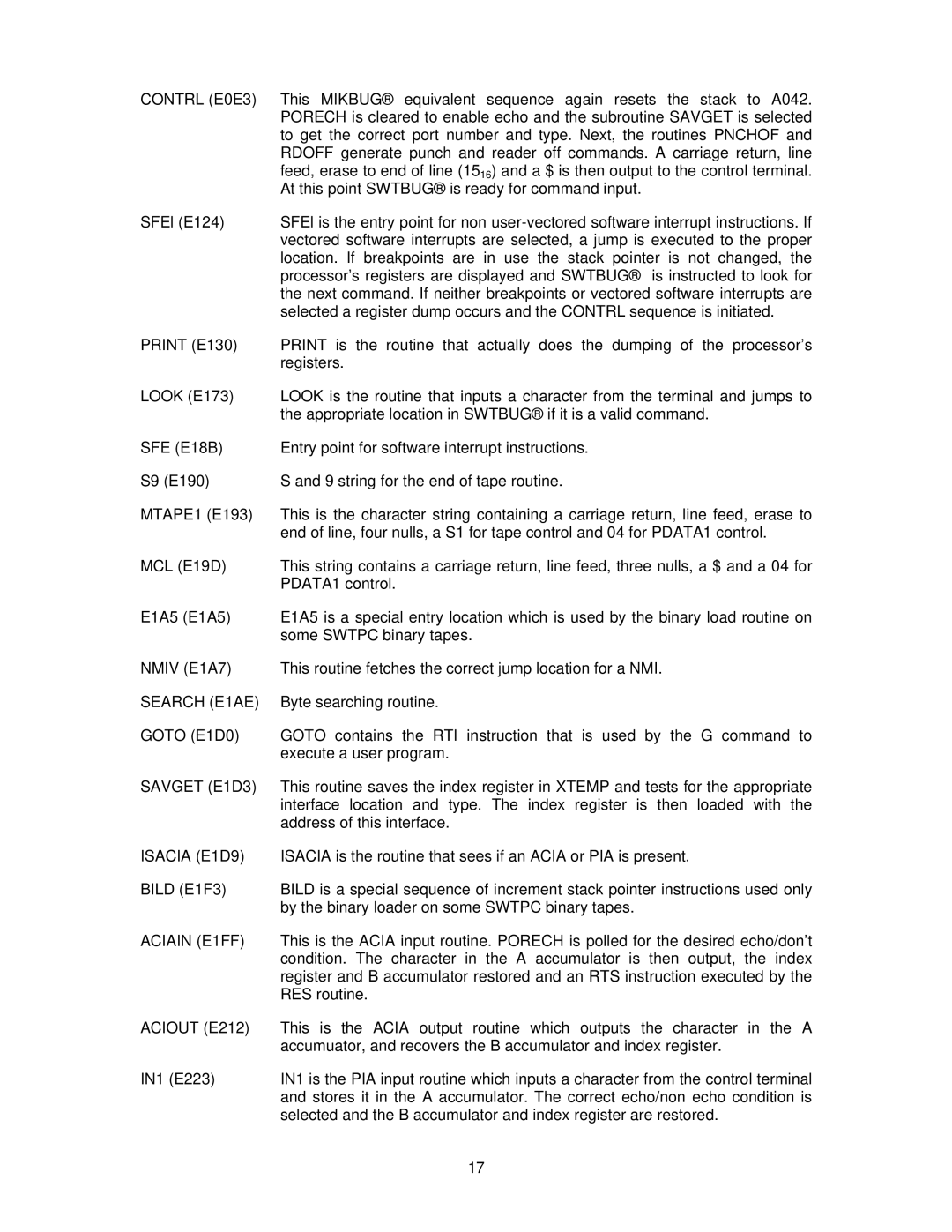CONTRL (E0E3) | This MIKBUG® equivalent sequence again resets the stack to A042. |
| PORECH is cleared to enable echo and the subroutine SAVGET is selected |
| to get the correct port number and type. Next, the routines PNCHOF and |
| RDOFF generate punch and reader off commands. A carriage return, line |
| feed, erase to end of line (1516) and a $ is then output to the control terminal. |
| At this point SWTBUG® is ready for command input. |
SFEl (E124) | SFEl is the entry point for non |
| vectored software interrupts are selected, a jump is executed to the proper |
| location. If breakpoints are in use the stack pointer is not changed, the |
| processor’s registers are displayed and SWTBUG® is instructed to look for |
| the next command. If neither breakpoints or vectored software interrupts are |
| selected a register dump occurs and the CONTRL sequence is initiated. |
PRINT (E130) | PRINT is the routine that actually does the dumping of the processor’s |
| registers. |
LOOK (E173) | LOOK is the routine that inputs a character from the terminal and jumps to |
| the appropriate location in SWTBUG® if it is a valid command. |
SFE (E18B) | Entry point for software interrupt instructions. |
S9 (E190) | S and 9 string for the end of tape routine. |
MTAPE1 (E193) | This is the character string containing a carriage return, line feed, erase to |
| end of line, four nulls, a S1 for tape control and 04 for PDATA1 control. |
MCL (E19D) | This string contains a carriage return, line feed, three nulls, a $ and a 04 for |
| PDATA1 control. |
E1A5 (E1A5) | E1A5 is a special entry location which is used by the binary load routine on |
| some SWTPC binary tapes. |
NMIV (E1A7) | This routine fetches the correct jump location for a NMI. |
SEARCH (E1AE) | Byte searching routine. |
GOTO (E1D0) | GOTO contains the RTI instruction that is used by the G command to |
| execute a user program. |
SAVGET (E1D3) | This routine saves the index register in XTEMP and tests for the appropriate |
| interface location and type. The index register is then loaded with the |
| address of this interface. |
ISACIA (E1D9) | ISACIA is the routine that sees if an ACIA or PIA is present. |
BILD (E1F3) | BILD is a special sequence of increment stack pointer instructions used only |
| by the binary loader on some SWTPC binary tapes. |
ACIAIN (E1FF) | This is the ACIA input routine. PORECH is polled for the desired echo/don’t |
| condition. The character in the A accumulator is then output, the index |
| register and B accumulator restored and an RTS instruction executed by the |
| RES routine. |
ACIOUT (E212) | This is the ACIA output routine which outputs the character in the A |
| accumuator, and recovers the B accumulator and index register. |
IN1 (E223) | IN1 is the PIA input routine which inputs a character from the control terminal |
| and stores it in the A accumulator. The correct echo/non echo condition is |
| selected and the B accumulator and index register are restored. |
17
